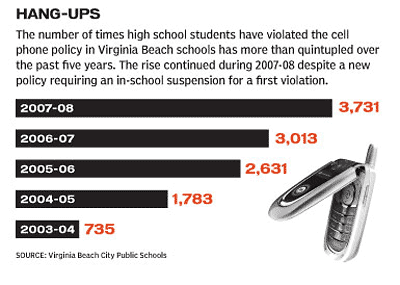I allow cell phones and iPods in class. It’s never been an issue for me because I don’t make it about trust or control. That’s why the school from the image below and this micromanaging principal have both had so many problems. Instead I make it an issue of respect and personal productivity. I became an educator to teach, foster growth, and have fun. Not to police.

School Problems with Bad Cell Phone Policy
So here’s how I deal with cell phones and iPods. It’s fun, it embraces 21st century technology, it teaches students to be respectful, and it teaches them how to manage their time and attention productively.
Rule #1. Absolutely no one can use phones or iPods when someone has the floor.
This means whenever a classmate is speaking, I’m speaking, or something else comes up that is “floor worthy” – which means that it deserves undivided attention and respect – cell phones and iPods are off limits.
I explain that this isn’t just a school thing; it’s real world etiquette (often I have to explain what etiquette means too). You wouldn’t show up to a business meeting with head-phones in your ears. You wouldn’t dare stop your foreman from explaining his instructions in order to reply to a text. And you’d be ticked off if someone ignored something important you were saying to check their phone or iPod. It’s about respect.
Rule #2. You can use phones or iPods when it’s individual work time.
I like the message of autonomy that this sends out to my students; however, I include this caveat:
“Listen, when it comes to work and school you can be doing one of two things: getting ahead or getting behind. So think about that when you scroll through your music to build the best playlist ever, or text your friend about whatever so and so said.”
Then, when I see them really wasting time in class with their iPod or cell phone, I’ll just shout out and say, “Hey, Julie, are you getting ahead or getting behind?”
And the answer is almost always a mumbling, “Behind.”
And I reply with, “And what do you think you should really be doing?”
“Getting ahead.”
“Then you know what to do.” And nine times out of ten they put their phone/iPod down and get back to work.
I like this because it makes the issue positive and keeps it in their control. It’s fun, constructively embarrassing for some, and a good, experiential way to remind them that they’re not being productive. I remind them that they – and only they – are in control of themselves. They can do whatever they want, but a lot of what they do is counter-productive to their own goals and desires and dreams.
Rule #3: If you violate rule #1, the class stops to support your addiction.
Because, at the end of the day, that’s what it is: an addiction. Sneaking a peak (at the phone/music-player) instead of respectfully paying attention can be explained really well as a compulsion – a bad habit that hijacks the person. I explain this way of looking at cell phones and iPods to my students in advance. I explain that a great way of overcoming addictions is with a support group. And, with a big knowing smile on my face, I explain what happens when someone violates Rule #1 (i.e. uses their phone/iPod when someone has the floor). Here’s the procedure:
- Whatever was happening in class stops.
- The violator comes to the front of the class with his or her phone/iPod.
- The violator faces the class, holding his or her phone/iPod in the air, and repeats the following sentences after me:
- “Hello, my name is Johnny (for example).”
- I get the class to say, “Hi Johnny.”
- Violator says, “I’m up here because I have a cell phone and/or iPod addiction.”
- Class says, “We’re here for you Johnny.”
- I usually say (again, in good spirit), “It’s OK Johnny, there’s lots of addicts out there. Don’t feel like you’re all alone.”
- Then the “addict” leaves his or her phone/iPod either on my front table or back desk (wherever I can keep an eye on it in case of theft).
And sometimes, if the student is a good sport and I catch them gazing at their phone/iPod afterwards, I’ll tease them a bit with something like,
“It’s tough isn’t it? Has this been the longest you’ve gone without it for a while? Remember, we’re here for you.”
This gets the class laughing but also reminds the other ‘would-be-addicts’ to think twice before whipping their phones/iPods out when they shouldn’t.
Again, this method is fun, it embraces 21st century technology, it teaches students to be respectful, and it teaches them how to manage their time and attention productively … something so important in this information age with its endless distractions.
Please feel free to leave comments and/or ask questions!

